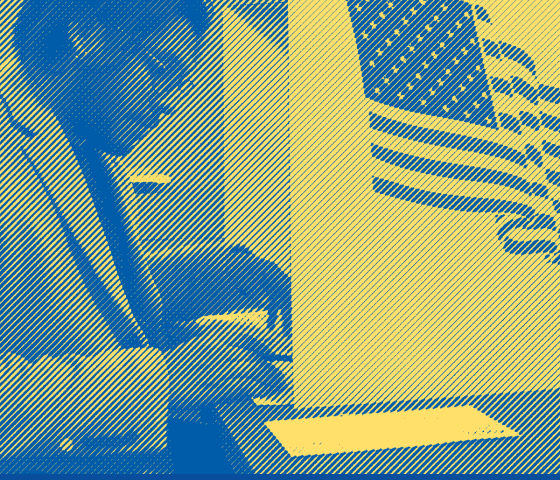ACLU of Iowa guest blogger Randy Evans is the executive director of the Iowa Freedom of Information Council.
By Randy Evans
The First Amendment isn’t long, but it certainly packs a lot of angst into those few words:
“Congress shall make no law respecting an establishment of religion or prohibiting the free exercise thereof; or abridging the freedom of speech, or of the press or the right of the people peaceably to assemble, and to petition the government for a redress of grievances.”
Most Americans embrace these concepts that are important foundations for democracy in the United States --- although there are times when these freedoms make us uncomfortable.
One of those times was in 1978 when the American Civil Liberties Union defended the right of neo-Nazis to march in the streets of Skokie, Ill. The march wasn’t planned for just any Chicago suburb. Skokie’s population was mostly Jewish, and many residents had survived the Nazi Holocaust during World War II.
There was discomfort in Iowa in 1965 when Mary Beth Tinker, John Tinker and Chris Eckhardt, wore black armbands to school to protest the war in Vietnam. They were told they could not return until they agreed to leave their armbands at home.
With ACLU lawyers representing them, the Tinker siblings and Eckhardt sued the Des Moines school district for violating their First Amendment rights. In a landmark decision in 1969, the U.S. Supreme Court ruled that students do not “shed their constitutional rights to freedom of speech or expression at the schoolhouse gate.”
The ACLU is back in court fighting another challenge to First Amendment rights --- this time, to the continuing efforts by Iowa’s governor and the Legislature to make it a crime to gather and publicize accurate information about conditions inside meatpacking plants, livestock production facilities and puppy mills.
Earlier this year, a federal judge struck down Iowa’s first law that attempted to do this. The judge said the statute was an unconstitutional intrusion on the First Amendment rights of undercover activists and journalists.
Three weeks later, the Legislature wrote a new version of the law and Gov. Kim Reynolds signed it. Last week, the ACLU sued Reynolds and Attorney General Tom Miller again on behalf of a coalition of food safety and animal welfare activists.
The new law makes it a crime for anyone to use deception to gain access to agricultural production facilities with the intent of causing physical or economic harm or other injury.
The nonprofit organization I lead, the Iowa Freedom of Information Council, and the Iowa Center for Public Affairs Journalism filed a friend-of-the-court brief in support of the ACLU’s first lawsuit.
In that brief, we wrote, “Denying the government the authority to punish undercover investigations into matters of public concern is essential to freedom of speech and press. … Undercover investigative techniques criminalized by the statute are an essential tool in revealing the kind of evidence of serious farm abuses that fuels the uninhibited marketplace of ideas the First Amendment was designed to foster.”
Paul Shapiro, a former official of the Humane Society of the United States, said there really isn’t another way to find out what’s happening inside slaughterhouses and farm facilities, absent these undercover investigations.
“When abuses become public through the results of an undercover investigation, they spark public debate necessary to spur reforms and hold industry accountable,” Shapiro said.
Some of my farming friends are ready to wring my neck for the Iowa FOI Council’s position on the old and new versions of the “ag gag” laws. But here are some key points I cite to them:
These undercover investigations are not conducted by people who break into the facilities. These investigators apply for and then are hired and trained to work there. And they do perform their jobs while watching for abusive practices.
Undercover investigators who go to puppy mills typically pose as customers wanting to buy a dog for themselves or as brokers who purchase puppies for pet stores.
The inhumane and unsanitary practices that are captured on undercover videos reflect poorly on the countless farmers, dog breeders and food processing companies that are good stewards who do not engage in such offensive practices.
But the solution isn’t to suppress unflattering attention from journalists or activists. Instead, with consumers increasingly concerned about how their food is produced and processed, lawmakers should focus on ways the government can weed out abuses by producers.
Consumers are concerned --- and lawmakers should be, too --- when undercover investigations produce evidence of hens with gaping, untreated wounds laying eggs among decaying corpses of chickens. Consumers and lawmakers should be angered when they see video of farm workers slamming baby piglets against concrete floors and sows being hit with metal rods. Consumers and lawmakers should be troubled when these see video of forklifts being used to carry cows to slaughter, violating federal regulations designed to protect against “mad cow” disease.
The Legislature has created an economic contradiction. When undercover investigations find no evidence of abuses or unsanitary practices, there is no publicity and no economic harm. But when videos show truthful information about abuses and problems, it’s not surprising such exposure generates boycotts, food safety recalls, citations for environmental, labor and health code violations, and, sometimes, criminal charges against the perpetrators.
Rita Bettis Austen, the legal director for the ACLU of Iowa, summarized the issue: “An especially grievous harm to our democracy occurs when the government uses the power of the criminal laws to target unpopular speech to protect those with power --- which is exactly what this law is about. Free speech means the government is not allowed to put the PR interests of one industry above the constitutional rights of its critics.”
She is correct. The First Amendment isn’t just for people you agree with.
***
Randy Evans can be reached at DMRevans2810@gmail.com.

